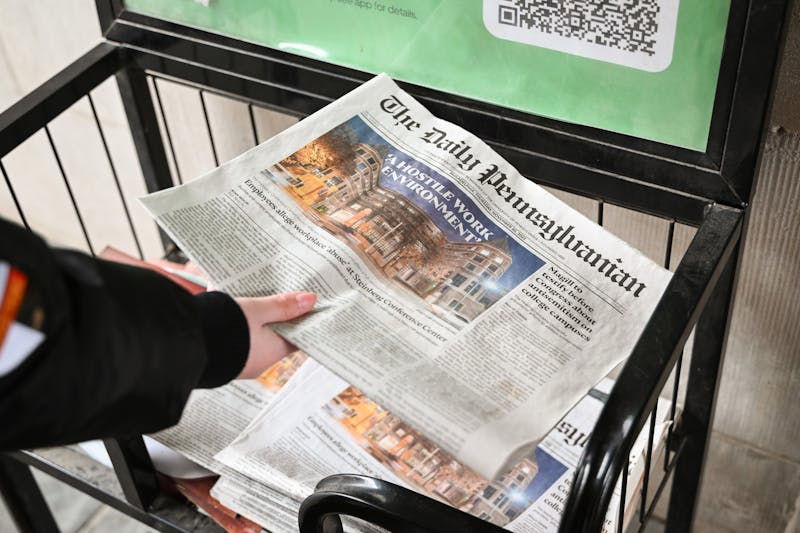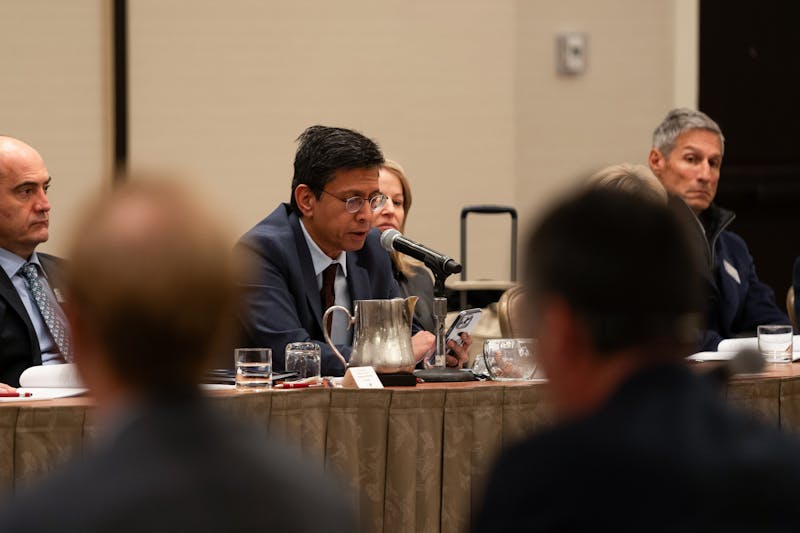
Dear Interim President Jameson,
The calls to address academic freedom, free speech, antisemitism, and Islamophobia indicate that people are hurting. Our University has an open wound, and now is the time for you to guide us towards recovery.
In the past year, walking on Locust Walk has immersed us in a sea of impassioned protests and fervent calls for action echoing from diverse groups across campus. Our University now stands under the scrutiny of the public eye, leaving the administration at a crossroads — but also with a rare opportunity to turn over a new leaf.
While Penn boasts its many stakeholders — and several groups in particular have recently made their voices loud and clear — students and faculty remain the heart of the institution. We have witnessed firsthand the imperfections and shortcomings of Liz Magill’s tenure and, more importantly, the entire administration’s response to the tensions on campus. Thus it is also our responsibility to contribute to a discourse that shapes the trajectory of our academic environment.
These issues dominate our conversations, our classroom discussions, and the news we consume. Taking into account the significant impact of these issues on us as students, we have outlined what we think will lead you to a successful tenure as interim president.
1. Use your position to your advantage.
Recognizing the temporary nature of your tenure presents a unique opportunity to bring about meaningful change without the normal constraints of long-term political considerations. As interim president, you can leverage this timeframe to implement initiatives that will align with the University’s core values to address existing challenges. It is imperative that you avoid complacency and not view your role as merely a caretaker but as a catalyst for change in the trajectory of the future of Penn’s institutional values. We urge you to set our University up for success and ensure an easy transition for our next president.
2. Take a stance and stick by it.
A major fault that contributed to Magill's downfall was that the University lacked a consistent and unwavering vision as the crisis unfolded. Partnered with the rising instances of antisemitism and Islamophobia on campus, this spelled trouble for her as the public face of the University. Don’t fall victim to external pressures from media, alumni, donors, or faculty. Your leadership must be grounded in strong ethics and values that you follow from day one.
We urge you to lead with a strong emphasis on personal and institutional integrity. This is undoubtedly going to involve making decisions that are not going to appease every shareholder. But even if people disagree with your take, they will respect that you have a backbone and stand by your opinions. As a physician, you follow the principles embedded in the Hippocratic Oath; use the same guidelines to approach challenges in your tenure.
As you aptly stated earlier this semester, “at times we encounter very challenging patients and circumstances and need to set aside our personal views and priorities to care for everyone.” You have made your living healing patients, and now it's your time to heal your most challenging patient yet.
3. Come talk to us.
We urge you to step out of the confines of College Hall and engage with us directly. Meet us where we are. Come into classrooms, sports games, and dorms. Attend gatherings at Penn Hillel, the Muslim Student Association, and the vast array of identity groups across campus. Frequent the dining halls. Walk on Locust. Be available. In doing so, you'll gain firsthand insight into the diverse needs and perspectives of the student body. If you don't talk to us, you won't truly understand what we need. Remember, we are the ones investing in our education — we are the customers. We are the primary stakeholders.
Holding regular office hours, like presidents at other Ivy League universities, would further provide students with a direct channel to express concerns, share ideas, and engage in constructive dialogue. It's essential to acknowledge that when people are vocal and passionate, it signifies that they are invested. We, as students, are trying to fulfill our responsibilities, and open communication with you is instrumental in creating a more collaborative University environment.
4. Start a new tradition of a ‘State of the University' address.
It is important to acknowledge that despite the history of our institution, we must adapt to today’s fast-paced environment — an environment that demands a leader who can maintain a clear, public focus on the tens of thousands of students, faculty, and staff who fulfill Penn’s essential missions every day. Alumni may have fond memories of the institution as it was, but it is important for them to understand that the current dynamic on campus is starkly different from their idealized memories.
Embark on a new tradition by speaking directly to the University through State of the University addresses. Under Magill’s tenure, constant emails with unclear and evasive messages sounded apathetic and led to frustration. Stand at the heart of campus, in the shadow of Benjamin Franklin, and speak to us directly. We want to hear from you.
Despite the challenges Penn has faced, we remain an extraordinary place for learning. It is imperative to recognize that, even amidst the media storm, our University stands resilient. The record-breaking number of applicants in the early decision cycle is a testament to the enduring appeal of a Penn education. Penn has provided us with unparalleled opportunities. Let's not allow the external noise to overshadow the invaluable experiences and education we've received. With your help, we can ensure that Penn remains an extraordinary University for many years to come.
Editorials represent the majority view of members of The Daily Pennsylvanian, Inc. Editorial Board, which meets regularly to discuss issues relevant to Penn's campus. Participants in these meetings are not involved in the reporting of articles on related topics. Reach us at edboardchair@dailypennsylvanian.com.
The Daily Pennsylvanian is an independent, student-run newspaper. Please consider making a donation to support the coverage that shapes the University. Your generosity ensures a future of strong journalism at Penn.
Donate












